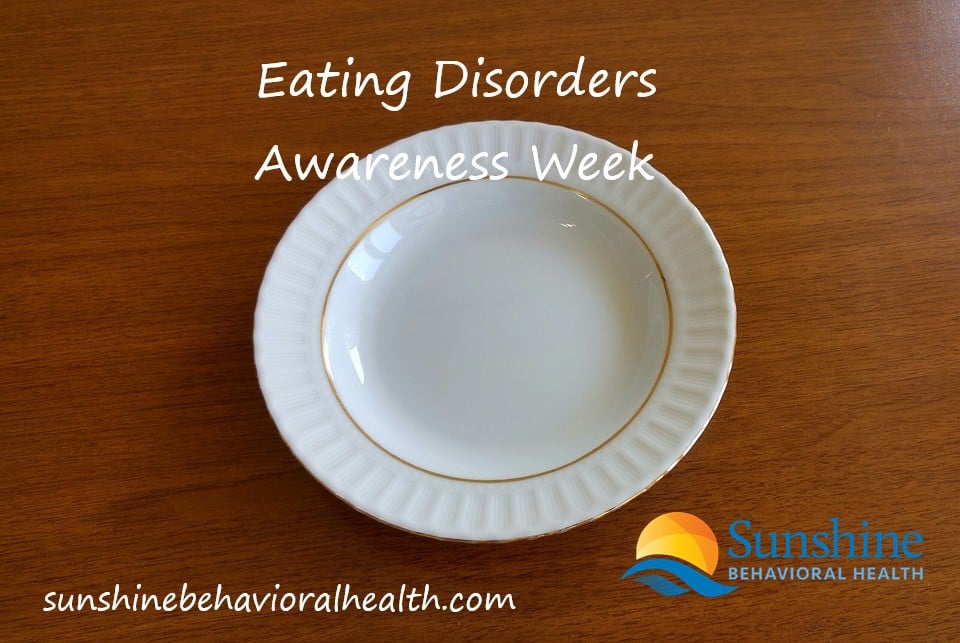
Eating Disorders, Substance Abuse, and Addiction: They’re Connected
Occurring every February, National Eating Disorders Awareness Week raises awareness about various eating disorders (EDs). It also informs people that the condition frequently accompanies other conditions, such as substance abuse and addiction.
Statistics about eating disorders and substance abuse
Studies have found that the conditions often occur together:
- As many as 35% of the people who were dependent on or abused alcohol or drugs also had eating disorders.
- As many as 50% of people who had eating disorders also abused drugs or alcohol.
- About 20% of women and men who sought treatment for substance use disorders reported that they also engaged in binge eating.
- 24.8% of men and women with binge eating disorders also had a substance use disorder.
Such statistics indicate the prevalence of substance abuse and eating disorders.
Why substance abuse and eating disorders occur together
There are many possible reasons why people could develop both eating disorders and problems with substance abuse or addiction.
Using substances might be a way to feel less hungry. According to estimates, as many as 50% of people with eating disorders also abuse diet pills.
Other people might use alcohol to suppress their appetites or use drinking behaviors to replace eating. Researchers have discovered that people who used binge eating to address their emotions also drank heavily on other occasions for the same reasons.
Still others drink or use drugs as ways to cope with eating disorders or other psychological or physical conditions.
Assessing the conditions
To determine whether they have eating disorders, substance abuse, or addiction, people might want to use some useful screening tools:
- Eating disorders screening tool from the National Eating Disorders Association
- Eating disorder test from Mental Health America
- Different diagnostic tools for determining substance abuse from the University of Missouri-Kansas City School of Nursing and Health Studies
- Various tools to screen for alcohol or drug use from the charity SMART
While these tools could be helpful to determine if someone has a problem, they aren’t meant to replace treatment or professional assistance. Since eating disorders and substance abuse (or addiction) frequently occur together, it’s important to treat them together.
Many addiction rehab centers and programs offer dual diagnosis programs. A dual diagnosis occurs when someone is living with substance abuse or addiction along with another condition, such as an eating disorder. Dual diagnosis approaches treat both conditions so one doesn’t influence (and worsen) the other.
Treating the conditions
Therapy is often a crucial part of treating eating disorders and addictions:
During interpersonal therapy (IPT), therapists help clients explore their feelings, apply these feelings in their relationships, and encourage them to seek support from others.
Cognitive behavioral therapy (CBT) helps people address their thoughts, feelings, and ultimately, their behaviors.
These approaches acknowledge that our relationships, thoughts, can influence our actions. If we understand why we think, feel, behave, and relate in certain ways, we might be able to address negative factors and embrace positive ones.
Support groups can also address substance abuse, addiction, and eating disorders. Some prominent organizations and programs that feature support groups include:
- SMART Recovery for substance abuse and addiction
- Alcoholics Anonymous (AA) and Narcotics Anonymous (NA) for problems with alcohol or drugs
- National Association of Anorexia Nervosa and Associated Disorders
- National Alliance for Eating Disorders
Eating disorders, substance abuse, and addiction are difficult on their own and can be even more difficult together. But treatment, support, and education can go a long way in understanding them and the people who face them.
Sources
nationaleatingdisorders.org – Statistics & Research on Eating Disorders
ncbi.nlm.nih.gov – Features Associated with Diet Pill Use in Individuals with Eating Disorders
ncbi.nlm.nih.gov – The Risk of Substance Abuse Among Adolescents and Adults with Eating Disorders
sunshinebehavioralhealth.com – How Eating Disorders Co-Occur with Substance Abuse
sunshinebehavioralhealth.com – Learn About What Dual Diagnosis Treatment Programs Offer
interpersonalpsychotherapy.org – Overview of IPT
A Message From Our CEO
Medical disclaimer:
Sunshine Behavioral Health strives to help people who are facing substance abuse, addiction, mental health disorders, or a combination of these conditions. It does this by providing compassionate care and evidence-based content that addresses health, treatment, and recovery.
Licensed medical professionals review material we publish on our site. The material is not a substitute for qualified medical diagnoses, treatment, or advice. It should not be used to replace the suggestions of your personal physician or other health care professionals.





